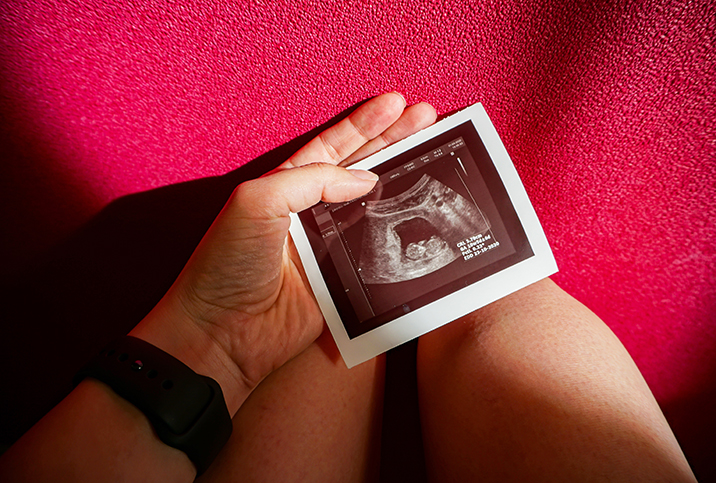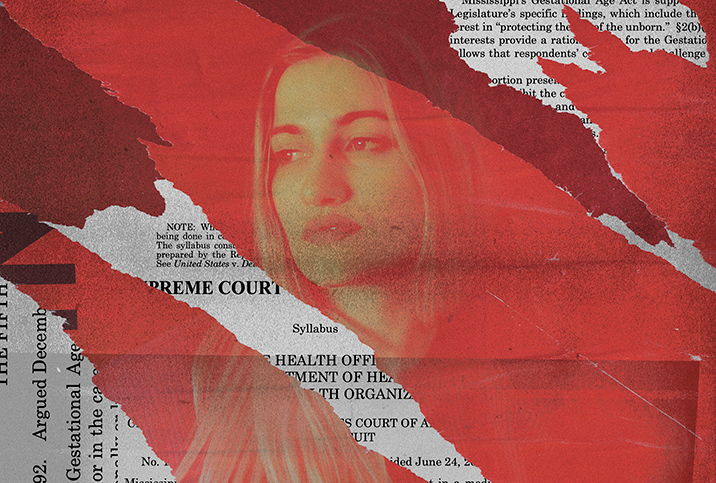Jessa Duggar Seewald Shares Miscarriage Experience

When reality TV personality Jessa Duggar Seewald, 30, experienced complications with her pregnancy, she needed a procedure many women no longer can access in anti-abortion states.
In December, at 11 weeks along in her fifth pregnancy, the former TLC "19 Kids and Counting" star experienced light bleeding, or spotting, during a sickness-filled holiday season, Seewald shared in a YouTube video posted Feb. 24.
A follow-up emergency prenatal ultrasound appointment confirmed her worst fears.
"As soon as she started taking a look at the baby, I could tell there was some concern in her voice," Seewald described in her YouTube post. "She said, 'Well, the sac looks good; baby does not.' Honestly, nothing could have prepared me for the weight of those words in that moment."
In an 18-minute video entitled "Heartbreak Over the Holidays," Seewald walked followers through her painful miscarriage, from the first signs to her recommended treatment and recovery.
"I feel like in some ways miscarriages can be so much more jarring because you don't have clear signs of something going wrong," she said. "I mean I had minimal spotting for like 24 hours and that was it."
The experience Seewald had in Arkansas led some people to question the inequality of healthcare access to mothers in life-threatening situations.
Amanda Zurawski needed a procedure when she was miscarrying in August 2022. Instead, she was hospitalized with sepsis as she and her husband waited for their much-wanted firstborn to miscarry, a scenario she said sounded like the plot of a dystopian novel. She's the lead plaintiff in Zurawski v. Texas, a lawsuit on behalf of five Texan women and two OB-GYN doctors who were either physically or professionally harmed because of Texas' abortion ban, which prohibits abortion care after six weeks.
About miscarriage
Pregnancy loss that occurs before 20 weeks is considered a miscarriage. About 10 percent to 20 percent of all pregnancies in America end in miscarriage, according to Mayo Clinic, the majority of which happen before the 12th week of pregnancy.
Signs of an impending miscarriage may include:
- Vaginal spotting or bleeding
- Abdominal or lower back pain or cramping
- Expelling tissue from the vagina
During her most recent pregnancy, Seewald said she had such severe morning sickness with her fifth child that she couldn't stomach taking her prenatal vitamins.
In her video, the TV personality said her miscarriage experience made her temporarily question God. "Like, why would you give us this baby for such a short time?" she said. But she found comfort in a Christian Bible passage.
"[I] was able to thank God in that moment for giving us this life, even if we'd never get to hold this baby in our arms," she said.
The causes of miscarriage vary widely and include chromosomal problems, intrauterine fetal demise, molar pregnancy or maternal health conditions, such as uncontrolled diabetes.
Women who are overweight or underweight, and those who smoke, drink alcohol or consume illegal drugs during their pregnancies are at a higher risk of miscarriage.
Past the age of 35, pregnant women have an increasingly higher risk of miscarriage than their younger peers. A 35-year-old pregnant woman has a 20 percent chance of having a miscarriage; by age 45, the chance of miscarriage skyrockets to 80 percent.
Pregnant women experiencing miscarriage symptoms should immediately consult the advice of a medical professional.
Treatment
The process of miscarrying commonly happens naturally, sometimes before a woman even knows she's pregnant.
In certain cases, such as Seewald's, a patient may need a surgical procedure to remove the remaining tissue. Without doing so, a woman can find herself sick with sepsis, a life-threatening infection capable of killing a person in fewer than 12 hours.
A D&C—dilation and curettage—is an outpatient surgical procedure in which a doctor dilates the patient's cervix and uses an instrument called a curette to scrape the remaining tissue from the uterine wall.
The reality TV personality opted for the D&C procedure with her doctor's advice, she said, because of her history of hemorrhages and concerns for her health if she was unable to "pass the baby at home."
Seewald's public omission of her procedure quickly gained attention from various media outlets, with some pointing to the fact that a D&C is another name for the method used in a surgical abortion.
The famously anti-abortion evangelical Christian once compared abortion to the Holocaust in an Instagram post when she was 21.
At 30, the mother of four described her miscarriage experience as a "bad dream."
"Probably one of the most devastating moments is waking up after the procedure is over and just having this hollow feeling inside, because you know that the life that was in you is no longer there," she said. "You never did get to see your baby or say those goodbyes or anything. You're just laying there cold and alone."
Seewald said she was thankful to be able to return home to her children following the procedure.
"I can't imagine mommas who lose their first baby and they come home and they don't have an infant to hold," she said. "They don't have a little one to hug. Walking through loss, your heart goes out to moms who struggle with infertility or who have lost babies. It's very painful."
Zurawski v. Texas
The procedure Seewald needed and received in Arkansas is one the five women needed in Texas in the aftermath of the overturning of Roe v. Wade in June 2022.
In their lawsuit against the state of Texas, the five women claim they were delayed the necessary care they needed—a D&C—when they experienced life-threatening pregnancy complications because of the state's overarching abortion ban.
Prior to the implementation of Texas Senate Bill 8, according to the nonprofit Center for Reproductive Justice, Texas abortion providers performed an estimated 55,000 abortions annually. Now, patients seeking abortions or D&C procedures in Texas must travel out of state or wait until they have such severe life-threatening complications that a hospital will take the risk to perform a D&C.
Zurawski said the delay in healthcare during her miscarriage may have cost her future fertility.


















